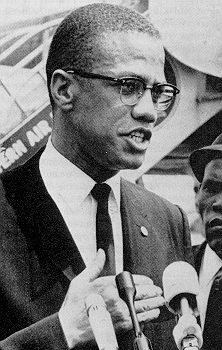
David Walker
believed that God caused nations that practiced slavery to rise against
themselves and
destroy themselves. According to Walker, Moses was an example by which
all African Americans in the US
should live by but fail to do because they will not separate themselves
from the benefits of the white world for
the sake to true freedom.
In his Fourth
of
July oration, Frederick Douglass addresses the
problems that the African Americans
face. He pointed out that they were not free because they did not share
a place of equality with Whites. Like
Walker, Douglass insisted that until the African American will stand up
for his freedom and fight for it, he will
never get because the White man is not going to freely hand it over to
him.
Dr. Martin Luther King, Jr.,
encouraged the African American people to take a non violent approach
whereas  Malcolm
X insisted that violence was needed for a "real revolution."
Malcolm refuted King's claim of a Negro
revolution by insisting that a revolution requires bloodshed and fight
for the ownership of land. Like Walker
and Douglass, and Nat Turner, Malcolm mocked the attempt of peaceful
revolution and rallied blacks to use
force to gain their rights. Malcolm's view was similar to
Malcolm
X insisted that violence was needed for a "real revolution."
Malcolm refuted King's claim of a Negro
revolution by insisting that a revolution requires bloodshed and fight
for the ownership of land. Like Walker
and Douglass, and Nat Turner, Malcolm mocked the attempt of peaceful
revolution and rallied blacks to use
force to gain their rights. Malcolm's view was similar to  Fanon's:
Colonizers can't protect the economic and
social rights of the colonized because it would contradict what they
are doing, therefore, force is necessary in
gaining independence. Both believed that the white man would never
readily hand over independence to the
African. Malcolm also shared the beliefs of Nuyerere, Senghor and
Nkruma. Nuyerere
maintained that the
traditional African political system was a one party democracy that did
not rely on the opposition that the
West's two party democracy relied on. Nuyerere and Malcolm both called
for the unity of African descendants.
Fanon's:
Colonizers can't protect the economic and
social rights of the colonized because it would contradict what they
are doing, therefore, force is necessary in
gaining independence. Both believed that the white man would never
readily hand over independence to the
African. Malcolm also shared the beliefs of Nuyerere, Senghor and
Nkruma. Nuyerere
maintained that the
traditional African political system was a one party democracy that did
not rely on the opposition that the
West's two party democracy relied on. Nuyerere and Malcolm both called
for the unity of African descendants.  Senghor believed in democratic
socialism in which the people own private property. In a sense Malcolm
was
calling for a similar thing. He wanted the African American people to
gain ownership of the "state."
Senghor believed in democratic
socialism in which the people own private property. In a sense Malcolm
was
calling for a similar thing. He wanted the African American people to
gain ownership of the "state."
King encouraged African Americans to not become bitter in their struggle and not to revert to the use of violence to achieve freedom. His ideas are likened to Cabral's idea of cultural resistance in which people retaliate against an oppressor by clinging to their culture. Cabral also encouraged his people to take a nonviolent approach in the pursuit of freedom.
Asante's idea of Afrocentric inquiry called for African peoples to look at the cosmos from the perspective of the traditional African culture. Africology required Africans to view human behavior and things that happen within the cosmos from an Afrocentric point of view. This is similar to Nkruma's idea on consciencism which encourages people to incorporate the ideas of Islam, Christianity, etc. into the traditional African beliefs. Neither Asante nor Nkruma tells the African people to ignore the things they have learned, but rather to view everything in the context of their African Culture.
All of these men were working toward the same goal: freedom for African peoples all over the world. Some such as Malcolm, Nuyerere, Senghor and Nkruma. insisted that revolution and force were necessary to gaining freedom. King and Cabral both rallied for nonviolent ascertainment of freedom and equality.